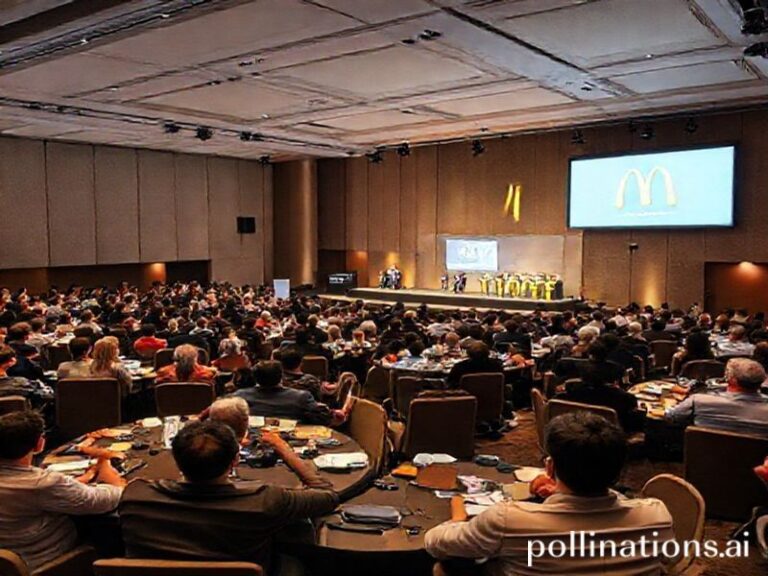Global Athletics: The World’s Most Expensive Group Therapy Session
ATHLETICS: THE PLANET’S MOST EXPENSIVE MASS COPING MECHANISM
By the time the sun rises over the Maracanã, it has already set on a makeshift track in Svalbard where three Norwegian scientists jog in minus-20°C darkness, trying to outrun existential dread. Athletics, in its noble guise as the pursuit of human excellence, is really just the globe’s most elaborate group therapy session—except the co-pay is national pride, broadcast rights, and the occasional human-rights scandal.
Every four years we gather to watch people in aerodynamic underwear throw metal objects farther than physics should allow, while commentators speak of “universal values” between carefully scheduled ad breaks for sugar water and sports betting apps. The Olympic Charter claims athletics “promotes mutual understanding,” which is adorable considering the current medal table is a proxy war fought in Lycra. The United States, China, and Russia (competing this cycle under the flag of “Look, a Squirrel!”) treat podium counts the way bond traders treat yield spreads—only the numbers are bigger and the doping tests slightly louder.
Yet away from the spotlights, the sport is quietly colonizing new frontiers. In Nairobi, Eliud Kipchoge’s sub-two-hour marathon has turned suburban cul-de-sacs into pilgrimage routes where weekend warriors chase personal bests and intestinal parasites in equal measure. Meanwhile, in Tokyo, office workers practice race-walking in underground malls, perfecting a hip-wiggle that looks like a salaryman trying to sneak past his boss without spilling coffee. The message is consistent across time zones: if you move your legs fast enough, maybe the rest of the world will slow down.
Of course, no international story is complete without the proper villains. Enter World Athletics, the governing body that recently discovered—after decades of lucrative amnesia—that certain national federations might be trafficking teenagers like Amazon Prime parcels. The remedy? A new integrity unit whose budget is roughly one tenth of the CEO’s annual “legacy fund” lunch allowance. Reform, like a steeplechase water jump, is designed to look dramatic while ensuring most participants stay dry.
Still, the show must go on, preferably in a country willing to bulldoze a neighborhood or two for a stadium that will later serve as the world’s most photogenic parking lot. Qatar’s Khalifa International Stadium—air-conditioned, naturally—hosted the 2019 World Championships where athletes competed in October heat that still managed to melt the soles of officials’ Ferragamos. The event concluded with a fireworks display visible from orbit, which was fitting since the carbon footprint was probably detectable from Mars.
The geopolitical subplot thickens in the women’s arena, where athletics has become a convenient stage for progressive posturing. When the IOC finally allowed Afghan women to compete under a neutral flag, commentators hailed it as a triumph of sport over politics—as if the Taliban would lay down their rifles because someone ran 400 meters in hijab. The gesture was laudable, but it also made for terrific B-roll during the commercial for a European airline that still refuses to hire female pilots.
Even the runners themselves have begun to notice the absurdity. Post-race interviews now feature athletes thanking “my sponsor, my coach, and the algorithm that decided this lane assignment.” The latest controversy involves shoe technology so advanced it allegedly turns plodding hobbyists into world-beaters. Nike calls it innovation; the purists call it motorsport with arches. The Court of Arbitration for Sport, ever the Solomon of suburbia, ruled that the shoes are legal but only if they feel sufficiently embarrassed about it.
And still we watch, because the alternative is reading quarterly earnings reports or doom-scrolling climate data. Every finish line is a fleeting reminder that humans are capable of extraordinary grace, even if the price of admission is a surveillance state-level biometric profile and a lifetime supply of electrolyte drinks. In a world that can’t agree on carbon limits or basic human dignity, we agree—temporarily—on whether someone’s foot grazed a white line. That, dear reader, counts as progress.
So lace up, tune in, and try not to think about the sweatshop origins of your sneakers. The planet is running itself ragged, and the least we can do is sprint alongside it, laughing all the way to the oxygen tent.







